| Srl | Item |
| 1 |
ID:
114342
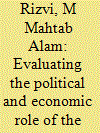

|
|
|
|
|
| Publication |
2012.
|
| Summary/Abstract |
The Islamic Revolutionary Guards Corps (IRGC) is Iran's most powerful security and military organisation, responsible for the protection and survival of the regime. Over time, the IRGC has attained a position of dominance vis-à-vis the regular army (Artesh). In due course, the Guards have also been transformed into a leading political and economic actor. The major political role of the IRGC started with the election of the reformist presidency. However, the Guards' involvement in the Iranian economy began during Rafsanjani's presidency. In view of the importance of Iran and its military, especially the IRGC, this article seeks to analyse the political and economic roles of the IRGC. The article argues that the IRGC's political and economic role is likely to increase due to its unique relationship with Iranian political elites and in view of the current power struggle between various political factions within Iran. However, any such expansion of the IRGC's role may not go unchallenged. The unintended consequence of this could be the erosion of the IRGC's credibility and people's trust.
|
|
|
|
|
|
|
|
|
|
|
|
|
|
|
|
| 2 |
ID:
192284
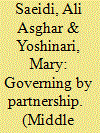

|
|
|
|
|
| Summary/Abstract |
This article will discuss the partnership of Abdolhossein Nikpour and the Chambers of Commerce with the Iranian government in managing the national economy from the 1920s until the 1950s. In particular, it challenges the state-society paradigm, where it shows that Nikpour, as well as other merchants and entrepreneurs of the Chambers nationwide, worked with the Iranian government while striving to maintain their economic and political autonomy. Conversely, the Iranian government depended on the expertise of these economic actors. Hence, this article will offer new perspectives on Iran’s twentieth-century political economy. Based on their collaborative research, including Iranian, Soviet, and British primary sources, the authors conclude that Nikpour was a driving force of both the Chambers and Iran’s modern economy for most of his lifetime, encompassing the interwar, wartime, and early postwar periods. Ultimately, however, Nikpour and the Chambers’ power was curtailed by Mohammad Reza Shah in the late 1950s.
|
|
|
|
|
|
|
|
|
|
|
|
|
|
|
|
| 3 |
ID:
040749
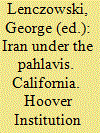

|
|
|
|
|
| Publication |
California, Hoover Institution Press, 1978.
|
| Description |
xxii, 550p.hbk
|
| Standard Number |
0817966412
|
|
|
|
|
|
|
|
|
|
|
|
Copies: C:1/I:0,R:0,Q:0
Circulation
| Accession# | Call# | Current Location | Status | Policy | Location |
| 018206 | 955.05/LEN 018206 | Main | On Shelf | General | |
|
|
|
|
| 4 |
ID:
134817
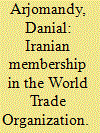

|
|
|
|
|
| Summary/Abstract |
Iran is the largest economy that is not currently included in the World Trade Organization (WTO). This paper addresses why Iran has not yet joined the WTO and whether it is ready to join. Iran's interaction with the General Agreement on Tariffs and Trade (GATT) in 1948 marks the beginning of the relationship between Iran and the WTO. To determine why Iran has not yet entered the WTO, the role and penetration of powerful members of the WTO and Iran's economic position are examined. To determine whether Iran is ready to join the WTO, literature is reviewed concerning the effects of joining for the five most-affected major industries in Iran. The major disadvantages of joining the WTO are described as short-term effects, and the advantages of joining are described as long-term goals. Currently, no clear scheme has been offered to handle the negative effects on the Iranian economy. As the major player, the Iranian government could achieve the long-term goals with a realistic and well-planned strategy or miss the mark through its inattention to the critical economic effects.
|
|
|
|
|
|
|
|
|
|
|
|
|
|
|
|
| 5 |
ID:
115426


|
|
|
| 6 |
ID:
112112
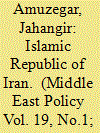

|
|
|
| 7 |
ID:
146784


|
|
|
|
|
| Summary/Abstract |
This article enquires into the socioeconomic causes of recurrent food scarcity in the nineteenth-century Middle East. Focusing on Iran as a case study, the paper shows that certain categories involved in the production and distribution of grain engaged in profiteering schemes and thereby contributed to the making of food shortage in urban settings. The most important of these groups were the government officials, the landed classes, and the grain merchants. The local bakers were also involved, but they did not have as decisive a role as the other groups. In showing how these categories engaged in market manipulation, the paper contends that food scarcity cannot be explained without a proper understanding of the commercialization of grain and the economic integration of the Middle East in the nineteenth century.
|
|
|
|
|
|
|
|
|
|
|
|
|
|
|
|